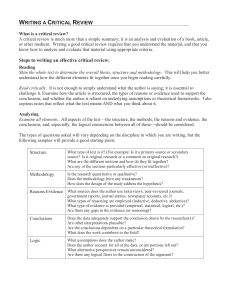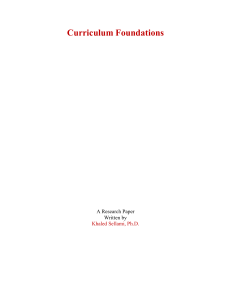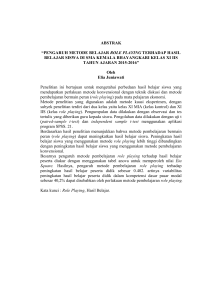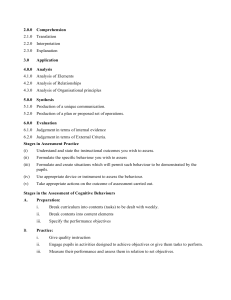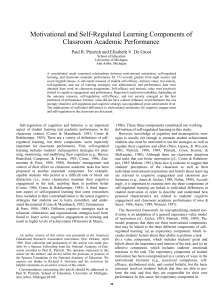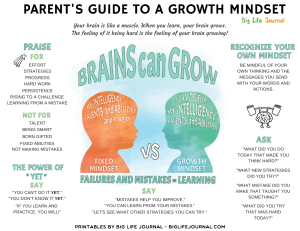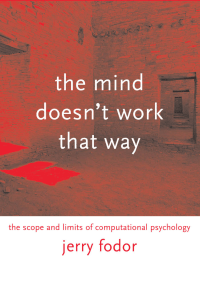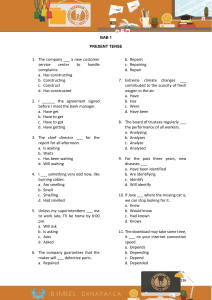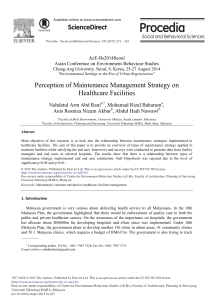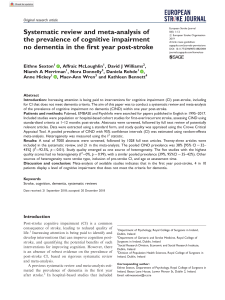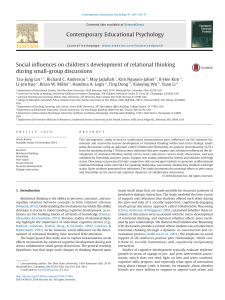Uploaded by
common.user13739
Video Games and Cognitive Abilities in Pakistani Children: A Study
advertisement
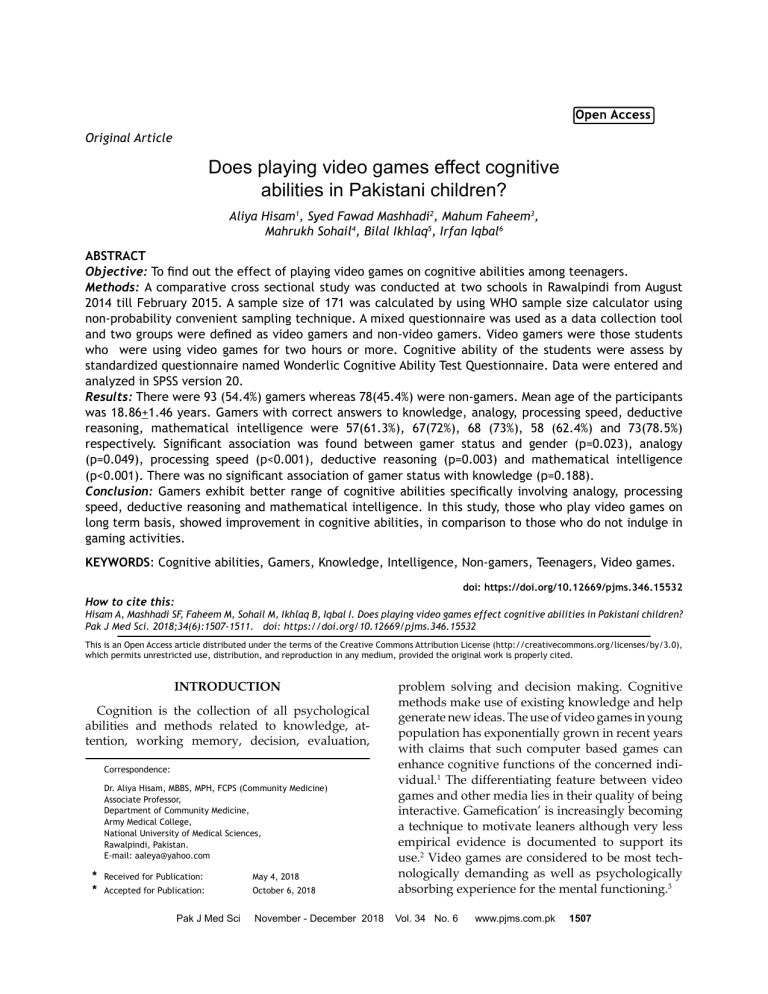
Original Article Does playing video games effect cognitive abilities in Pakistani children? Aliya Hisam1, Syed Fawad Mashhadi2, Mahum Faheem3, Mahrukh Sohail4, Bilal Ikhlaq5, Irfan Iqbal6 ABSTRACT Objective: To find out the effect of playing video games on cognitive abilities among teenagers. Methods: A comparative cross sectional study was conducted at two schools in Rawalpindi from August 2014 till February 2015. A sample size of 171 was calculated by using WHO sample size calculator using non-probability convenient sampling technique. A mixed questionnaire was used as a data collection tool and two groups were defined as video gamers and non-video gamers. Video gamers were those students who were using video games for two hours or more. Cognitive ability of the students were assess by standardized questionnaire named Wonderlic Cognitive Ability Test Questionnaire. Data were entered and analyzed in SPSS version 20. Results: There were 93 (54.4%) gamers whereas 78(45.4%) were non-gamers. Mean age of the participants was 18.86+1.46 years. Gamers with correct answers to knowledge, analogy, processing speed, deductive reasoning, mathematical intelligence were 57(61.3%), 67(72%), 68 (73%), 58 (62.4%) and 73(78.5%) respectively. Significant association was found between gamer status and gender (p=0.023), analogy (p=0.049), processing speed (p<0.001), deductive reasoning (p=0.003) and mathematical intelligence (p<0.001). There was no significant association of gamer status with knowledge (p=0.188). Conclusion: Gamers exhibit better range of cognitive abilities specifically involving analogy, processing speed, deductive reasoning and mathematical intelligence. In this study, those who play video games on long term basis, showed improvement in cognitive abilities, in comparison to those who do not indulge in gaming activities. KEYWORDS: Cognitive abilities, Gamers, Knowledge, Intelligence, Non-gamers, Teenagers, Video games. doi: https://doi.org/10.12669/pjms.346.15532 How to cite this: Hisam A, Mashhadi SF, Faheem M, Sohail M, Ikhlaq B, Iqbal I. Does playing video games effect cognitive abilities in Pakistani children? Pak J Med Sci. 2018;34(6):1507-1511. doi: https://doi.org/10.12669/pjms.346.15532 This is an Open Access article distributed under the terms of the Creative Commons Attribution License (http://creativecommons.org/licenses/by/3.0), which permits unrestricted use, distribution, and reproduction in any medium, provided the original work is properly cited. INTRODUCTION Cognition is the collection of all psychological abilities and methods related to knowledge, attention, working memory, decision, evaluation, Correspondence: Dr. Aliya Hisam, MBBS, MPH, FCPS (Community Medicine) Associate Professor, Department of Community Medicine, Army Medical College, National University of Medical Sciences, Rawalpindi, Pakistan. E-mail: [email protected] * * Received for Publication: May 4, 2018 Accepted for Publication: October 6, 2018 Pak J Med Sci November - December 2018 problem solving and decision making. Cognitive methods make use of existing knowledge and help generate new ideas. The use of video games in young population has exponentially grown in recent years with claims that such computer based games can enhance cognitive functions of the concerned individual.1 The differentiating feature between video games and other media lies in their quality of being interactive. Gamefication’ is increasingly becoming a technique to motivate leaners although very less empirical evidence is documented to support its use.2 Video games are considered to be most technologically demanding as well as psychologically absorbing experience for the mental functioning.3 Vol. 34 No. 6 www.pjms.com.pk 1507 Aliya Hisam et al. Students prefer learning new things in the form of games instead of the orthodox methods of reading books.4 Video games have deeply penetrated into the lives of children as well as young adults with studies proving that over 97% of the children in the United States play games for at least one hour per day.4,5 In USA video games brought in more than $25 billion, which is more than Hollywood’s box office sales in USA and Canada.6 Even in Pakistan over 20-million of the population is increasingly getting addicted to internet and is playing the video games both online and offline.7 Playing video games may lead to aggression, addiction and depression among the individuals.8,9 However researchers hove now started to document the benefits of video games in terms of enhancing mental health and well-being in children.10,11 Due to negative findings related to gaming addiction this topic has been identified by the media mostly leading to public condemnation of playing such games.12 Still game playing is believed to promote ICT skills and sports training as well as formal education. Playing video games improve the ability to sustain focus as well as successfully multitask among older adults.13 Studies in the West have been carried out to explore the harm associated with gaming, but there is a need to explore positive aspect of playing video games in Pakistani children community. As playing video games is increasing nationally, a proformabased study among the school going children of Pakistani community is conducted to assess the cognitive abilities of children. or 3D, racing, shooting etc) for two hours or more. Student playing video games less than two hours were categorized as non-video gamers. Cognitive ability of the students were assess by Wonderlic Cognitive Ability Test Questionnaire,14 a standardized questionnaire, which has to be answered within 12 minutes time, aiming cognitive functions such as knowledge, analogy, processing speed, deductive reasoning and mathematical intelligence. Their score was graded on a scale of one to four. All numbers from one to four were interpreted accordingly. At the end of the questionnaire, individual scoring was done by simple unitary method, which were graded as follows: METHODS RESULTS A comparative cross sectional study was conducted at two schools in Rawalpindi from August 2014 till February 2015. Using WHO sample size calculator, 171 sample size was calculated with Confidence Level (CL) of 95%, Anticipated population proportion (P) of 0.5 and Absolute precision (d) of 0.15). Permission from ethical review committee was taken. After informed verbal consent from children parents or guardians, convenient sampling technique was used to induct students into study. Those students were inducted who were between 15 to 21 years of age of both genders. Those students were excluded who were mentally or physically unfit or unwilling to participate. A mixed questionnaire was used as a data collection tool. Two groups were defined as Video gamers and non-video gamers. Video gamers were those students who using video games (2D To assess the cognitive abilities total 171 participants were included in the study out of which 93 (54.4%) were gamers whereas 78 (45.4%) were non-gamers. Mean age of the participants was 18.86±1.3 years. About 116 (67.8%) were males whereas 55 (32.2%) females participated in the study. Details are shown in Table-II. Participants not playing games at all were 34 (19.9%), 44 (25.7%) played for less than one hour, those playing for 2-3 hours were 63 (36.8%) whereas those playing for more than 4 hours were 30 (17.54%). During analysis of cognitive ability grades among gamers group, it was found that there were 1 (1.1%), 38 (40.9%), 45 (48.4%) and 9 (9.7%) participants as poor, average, good and best respectively. While among non-gamers, the participants grades were 16 (20.5%), 53 (67.9%), 8 (10.3%) and 1 (1.3%) as poor, average, good and best respectively. There Pak J Med Sci November - December 2018 Table-I: Wonderlic cognitive ability test questionnaire scoring. Scores Grading 1 2 3 4 Poor Average Good Best Data were entered and analyzed in STATA version 14. Qualitative data was presented as frequencies and percentages. Quantitative data was presented as mean and standard deviation such as age. Chi square test of significance was used to find association between the groups and qualitative variables such as gender and cognitive abilities. Independent sample t test was applied among group and age. A p-value of < 0.05 was taken as statistically significant. Vol. 34 No. 6 www.pjms.com.pk 1508 Video game’s effect on cognitive abilities of children Table-II: Demographic variables of the participants (n=171). Gamers (n = 93) n (%) Variables Age in years Mean ± SD Non-Gamers (n= 78) n (%) 18.86 ± 1.3 Gender Males Females 70 (40.9) 23 (13.5) Hours spent playing Not at all 0-1hrs 2-3 hrs 4-5 hrs 6-7 hrs 8 hrs or more Types of Games Shooters Sports Online multiplayer Action Stimulation Strategy None 0.35* 46(26.9) 32(18.7) 63 (36.8) 23 (13.5) 5 (2.9) 2 (1.2) p-value 0.188** 34 (19.9) 44 (25.7) 20(11.7) 46 (26.9) 30 (7.02) 30 (17.54) 17(7.02) 17 (9.94) 34 (19.88) - - *Independent sample t test, ** Chi square test. was a statistically significant association among the group and cognitive ability score (p<0.001). Details are shown in Fig.1. Gamers with correct answers to ‘knowledge’ segment were 57 (61.3%), while non-gamers who showed up with correct answers were 40 (51.3%). Analogy portrayed 67 (72%) of gamers with correct options, while non-gamers exhibiting correct scores were 45 (57.7%). Sixty-eight (73%) of gamers exhibited good processing speed, while non-gamers with appreciable processing speed were 24 (30.8%). Fifty-eight (62.4%) of gamers turned up with significant ability of deductive reasoning, while non-gamers found to be of comparable standard were only 31(39.7%). Gamers with remarkable mathematical intelligence were 73(78.5%), but on the contrary, non-gamers with perfect scores were 25 (32%). Significant association was found between Gender and Gamer status p=0.023). Knowledge and Gamer status (p=0.188); Analogy and Gamer status (p=0.049); Processing speed and Gamer status (p<0.001); Deductive Reasoning and Gamer status (p=0.003); Mathematical intelligence and Gamer status (p<0.001). Details are shown in Fig.2. Fig.1: Cognitive ability grades among gamers and non gamers (P<0.001). Fig.2: Correct cognitive responses of gamers verus non-gamers. Pak J Med Sci November - December 2018 Vol. 34 No. 6 www.pjms.com.pk 1509 Aliya Hisam et al. DISCUSSION Games challenge our mental skills in a way that performance in other tasks involving the same abilities, improves. In a study held in 2013, a doubleblind randomized clinical trial was conducted using a mind training game and a quiz game. A total of 32 individuals were enrolled. Before and after training, cognitive function were recorded. It was concluded that executive roles, work memory and processing speed were all improves in commercial mind training games.15 In our study we considered 171 participants who were tested with close ended questionnaires consisting of 13 questions from Wonderlic Cognitive Ability sample test. Time given to complete the test was three minutes and 30 seconds. Both gamers and non-gamers were included. Results were analyzed and comparison was made. Gamers showed overall higher scores. A study was conducted to find whether training older adults with video games increases their cognitive working and results were compare before and after training intervention. In the meta-analysis, 20 clinical trials during 1986 and 2013 were included which involved 474 trained and 439 controls adults. It was concluded that there were positive impact on cognitive functions among the video games performing groups including reaction time, memory and attention.15 Our study also showed that those playing video games had better knowledge, deductive reasoning, analogy, mathematical intelligence and memory. In another study, it was showed that the video games which focuses frequently on cognitive functions improves the tasks performance. The results of study proposed that more frequent usage of specific cognitive functions during gaming improves general cognitive functions of the individual.16 To find neural basis of superior visual and motor skills a study was conducted in 2015 which indicated that long-term video games playing was linked with greater white matter integrity in the motor and greater-tier visual pathways17 and another study also found that association among cortical thickness and duration of video games.18 These studies were conducted at a very advanced level involving technology which could assess changes at the neural level which frequent playing of video games could induce. These facts very strongly support positive association between playing video games and cognition. Pak J Med Sci November - December 2018 In one study it was shown that video gaming improves children’s problem solving skill, ability to sustain attention, pro-social behavior and certain non-cognitive tasks. There is no proof that video game playing increases hostility in children as purposed by some people.19 Similarly to test that whether older adults could improve multitasking ability by playing games as mental functions deteriorate with age, the researchers randomly assigned 46 healthy adult, with range of age group as 60 to 85 years, to two groups one playing 3D games and the other not playing. Those who played the multitasking game significantly improved their multitasking performance index when the training period was finished. These levels they reached were higher than the untrained ones.20 in this study sample, individuals from 15 to 21 years of age with mean age of around 18 years were enrolled. Assessment before exposure and training via specific game wasn’t done rather participants were randomly chosen from the population and they all had variable experience in gaming. We tested participants with time based Wonderlic cognitive ability test consisting of questions which assess mathematical intelligence, processing speed, memory, deductive reasoning and analogy. Analysis of scores obtained by gamers and nongamers showed a positive association between playing video games and cognitive ability. Gamers did well in all fields as compared to the nongamers. However, all participants had variable experience in gaming with all playing different types of games and for different lengths of time. So standardization could not be achieved. Moreover experimental trial would have been more reliable for this comparison but due to shortage of resources it wasn’t possible. CONCLUSION Gamers exhibit better range of cognitive abilities specifically involving knowledge, analogy, processing speed, deductive reasoning, and mathematical intelligence. In this study, those who play video games on long term basis, showed improvement in cognitive abilities, in comparison to those who do not indulge in gaming activities suggesting as gaming activities trigger enhancement in brain functions. RECOMMENDATIONS More studies should be planned under controlled conditions using advanced tools for cognitive Vol. 34 No. 6 www.pjms.com.pk 1510 Video game’s effect on cognitive abilities of children assessment for a more reliable comparison of gamers and non-gamers. Recruitment centers of school and colleges can use video games for testing and short-listing individuals. ACKNOWLEDGMENT The authors are very thankful to National University of Medical Sciences (NUMS) for their encouragement and support for our research activities. Grant Support & Financial Disclosures: None. REFERENCES 1. Papastergiou M. Exploring the potential of computer and video games for health and physical education: A literature review. Computers & Education. 2009;53(3):603-622. doi: 10.1016/j.compedu.2009.04.001. 2. Deterding S, Dixon D, Khaled R, Nacke L. From game design elements to gamefulness: defining gamification. Proceedings of the 15th International Academic MindTrek Conference: Envisioning Future Media Environments. ACM New York. 2011;9-15. doi: 10.1145/2181037.2181040. 3. Gackenbach J, Kuruvilla B, Dopko R. Video game play and dream bizarreness. Dreaming. 2009;19(4):218. 4. Thompson P. The digital natives as learners: Technology use patterns and approaches to learning. Computers & Education. 2013;65:12-33. doi: 10.1016/j.compedu.2012.12.022. 5. Weber R, Ritterfeld U, Mathiak K. Does playing violent video games induce aggression? Empirical evidence of a functional magnetic resonance imaging study. Media Psychology. 2006;8(1):39-60. 6. Crandall RW, Sidak JG. Video games: Serious business for America’s economy. Entertainment Software Association. 2006. 7. AEYN QU. About gaming and gamers in Pakistan. 2012. (Cited on 2014). Available from: http://pakigamers. blogspot.com/. 8. Anderson CA, Bushman BJ. Effects of violent video games on aggressive behavior, aggressive cognition, aggressive affect, physiological arousal, and prosocial behavior: A meta-analytic review of the scientific literature. Psycholog Sci. 2001;12(5):353-359. 9. Polman H, De Castro BO, van Aken MA. Experimental study of the differential effects of playing versus watching violent video games on children’s aggressive behavior. Aggressive Behavior. 2008;34(3):256-264. doi: 10.1002/ab.20245. 10. Wirth W, Ryffel F, Von Pape T, Karnowski V. The Development of Video Game Enjoyment in a Role Playing Game. Cyberpsychology, Behavior, and Social Networking. 2013;16(4):260-264. doi: 10.1089/cyber.2012.0159. 11. Squire K. From content to context: Videogames as designed experience. Educational researcher. 2006;35(8):19-29. 12. Aoyama Y, Izushi H. Hardware gimmick or cultural innovation? Technological, cultural, and social foundations of the Japanese video game industry. Research Policy. 2003;32(3):423-444. doi: 10.1016/S0048-7333(02)00016-1. Pak J Med Sci November - December 2018 13. Rosas R, Nussbaum M, Cumsille P, Marianov V, Correa M, Flores P, et al. Beyond Nintendo: design and assessment of educational video games for first and second grade students. Computers & Education. 2003;40(1):71-94. doi: 10.1016/S0360-1315(02)00099-4. 14. Testprep-online.com, (2015). Wonderlic Sample Test & Sample Questions - Scores & Answers – Test Prep-Online. [Online]. (Cited On April 2015]. Available at: https://www. testprep-online.com/wonderlic_sample_questions.aspx 15. Nouchi R, Taki Y, Takeuchi H, Hashizume H, Nozawa T, Kambara T, et al. Brain Training Game Boosts Executive Functions, Working Memory and Processing Speed in the Young Adults: A Randomized Controlled Trial. PLoS ONE. 2013;8(2):e55518. doi: 10.1371/journal.pone.0055518 16. Oei A, Patterson M. Enhancing Cognition with Video Games: A Multiple Game Training Study. PLoS ONE. 2013;8(3):e58546. doi: 10.1371/journal.pone.0058546. 17. Zhang Y, Du G, Yang Y, Qin W, Li X, Zhang Q. Higher integrity of the motor and visual pathways in long-term video game players. Front Hum Neurosci. 2015;9. 18. Kuhn S, Lorenz R, Banaschewski T, Barker G, Buchel C, Conrod P, et al. Positive Association of Video Game Playing with Left Frontal Cortical Thickness in Adolescents. PLoS ONE. 2014;9(3):e91506. 19. Suziedelyte A. Can Video Games Affect Children’s Cognitive and Non-Cognitive Skills? UNSW Australian School of Business Research Paper No. 2012 ECON 37. Available at SSRN: https://ssrn.com/abstract=2140983. doi: 10.2139/ssrn.2140983. 20. Anguera J, Boccanfuso J, Rintoul J, Al-Hashimi O, Faraji F, Janowich J, et al. Video game training enhances cognitive control in older adults. Nature. 2013;501(7465):97-101. doi: 10.1038/nature12486. Authors’ Contribution: HA: Conceived the topic, designed the methodology and revised the manuscript critically for important intellectual content SFM: Designed methodology and did bio statistical analysis. MF, MS, BI and II: Did procurement of data, introduction and discussion writing along with reviewing manuscript. Authors: 1. Dr. Aliya Hisam, MBBS, MPH, FCPS (Community Medicine). Associate Professor, 2. Dr. Syed Fawad Mashhadi, MBBS, MPH, MPhil. Assistant Professor, 3. Dr. Mahum Faheem, MBBS. 4. Dr. Mahrukh Sohail, MBBS. 5. Dr. Bilal Ikhlaq, MBBS. 6. Irfan Iqbal, MBBS. 1,2: Department of Community Medicine, Army Medical College, National University of Medical Sciences, Rawalpindi, Pakistan. 3-6: House Officers, Combined Military Hospital, Rawalpindi, Pakistan. Vol. 34 No. 6 www.pjms.com.pk 1511
